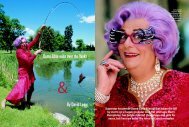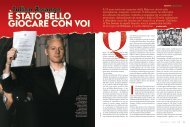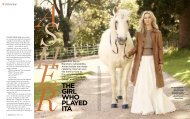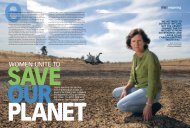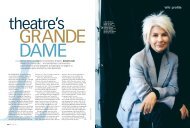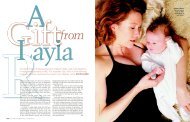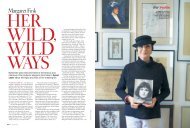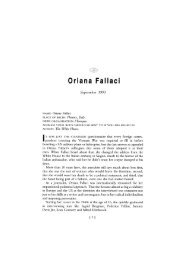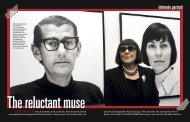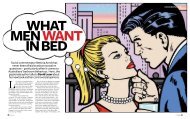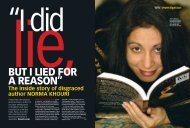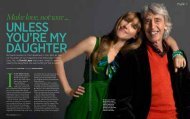24 GoodWeekend july 14, 2012 - David Leser
24 GoodWeekend july 14, 2012 - David Leser
24 GoodWeekend july 14, 2012 - David Leser
You also want an ePaper? Increase the reach of your titles
YUMPU automatically turns print PDFs into web optimized ePapers that Google loves.
<strong>24</strong> <strong>GoodWeekend</strong> <strong>july</strong> <strong>14</strong>, <strong>2012</strong>
ear<br />
mark carnegie is not your<br />
average investment banker. he has<br />
called for higher taxes for the<br />
rich, for a start. then there is the<br />
expletive-laden negotiation style.<br />
he talks to david leser about<br />
anger, equality, money and family.<br />
photograph by Tim Bauer<br />
his is how corporate power sometimes reveals itself when you’re<br />
the smartest and most aggressive guy in the room. Three business executives<br />
are seated at a long table inside the Australian boardroom of Lazard,<br />
one of the most venerable investment banks in the world. The room is<br />
framed by glorious, sweeping views of Sydney Harbour and the Opera<br />
House. Across the table from the three businessmen are two investment<br />
tyros from Britain, Simon Franks and Dean Dorrell, both of whom have<br />
been invited to the meeting by investment banker and senior adviser to<br />
Lazard, Mark Carnegie.<br />
The Brits are experts in buying and turning around distressed businesses<br />
and Carnegie wants them here today, ostensibly to offer some restructuring<br />
advice to the three men who are about to be hit by a freight train.<br />
Carnegie has poured considerable money into the three men’s light-<br />
engineering firm and their venture is now in deep trouble.<br />
Suddenly, the tall, dark wooden doors fly open and in walks the hulking<br />
figure of Carnegie. He offers no greeting, sits down at the table alongside<br />
the two Englishmen, glares at the chief executive facing him and lets loose:<br />
“MATE, YOU’RE F…ED. YOU’RE F…ED. I’M NOT HAVING ANY MORE<br />
OF IT. IT’S OVER. YOU’RE OUT. YOU’RE HOPELESS. YOU’RE F…ED.”<br />
The blood collectively drains from all three faces, and the chief executive<br />
is practically in tears. Carnegie pounds the table, stands up, storms out of<br />
the room and slams the heavy doors, causing the entire room to shudder.<br />
The meeting has lasted less than 30 seconds.<br />
Simon Franks wishes he’d videoed the scene. “I was always considered to<br />
be the more fly-off-the-handle guy,” he says, “but Mark makes me blush.<br />
He’s the Ali G of business. I’ve been at [subsequent] meetings where I’ve<br />
cringed … like, ‘I can’t believe he said that.’ ”<br />
Dean Dorrell, now managing director of Carnegie’s new venture-capitalraising<br />
business, M. H. Carnegie & Co, says, “My immediate interpretation<br />
was I wondered if Mark was all there, but then I wondered whether he’d just<br />
used us totally for effect.”<br />
For years, stories have circulated through the corridors of corporate<br />
Australia about the colourful, obscenity-filled language of one of Australia’s<br />
most intriguing, successful and polarising business figures. “He’s a terrorist,”<br />
says one person who declined to be identified. “You’d never take him into<br />
a meeting.”<br />
John Singleton, Carnegie’s business partner for more than 20 years, says,<br />
“I’m seen to have an expletive-laden vocabulary but compared to Mark I’m a<br />
choirboy. He’s like a bear. You wake it up and it’s angry. Mark would rather be<br />
eating fine food or drinking fine wine with fine company, listening to fine<br />
music, so if you’re going to make him talk about something like privatising<br />
in the boardroom The<br />
egaliTarian<br />
capiTalisT: investor<br />
and philanthropist mark<br />
carnegie (opposite, at<br />
his home in may) has<br />
been described as a<br />
“terrorist”, “the ali g<br />
of business” and “a<br />
massive f…ing intellect”.<br />
the ferries [a venture Singleton and Carnegie<br />
once considered], he’s going to get angry.”<br />
Singleton then offers a fair impersonation of a<br />
talking bear with a sore head: “F…ing ferries, f…<br />
ing transport c…s. They don’t do any f…ing<br />
thing. The f…ing things will sink, there’s no<br />
f…ing money in it … Grrrrrrrr … Well, now I’m<br />
awake I may as well kill something.”<br />
Singleton’s son, Jack Singleton, offers his own<br />
insights into the Carnegie style. “Mark will just<br />
keep turning the screws. He says the things that<br />
everyone thinks but no one is prepared to say.”<br />
Last year, Carnegie accompanied the younger<br />
Singleton to a meeting in a lawyer’s office in<br />
Sydney. Jack Singleton believed that a larger rival<br />
was sabotaging one of his companies and wanted<br />
Carnegie’s support. He briefed Carnegie in the<br />
lift before they met their adversaries.<br />
“I said, ‘Mate, what are you going to say?’ And<br />
he [Carnegie] says, ‘You don’t need to know the<br />
words; just come along with me.’ ” Carnegie<br />
walked into the room and exploded, waving<br />
around documents he hadn’t yet read. “YOU<br />
C…S HAVE SPENT YEARS F…ING THESE<br />
GUYS’ BUSINESS AND WE’RE NOW GOING<br />
TO F… YOURS.”<br />
Jack Singleton believes the word c… was used<br />
about 38 times before Carnegie stormed out into<br />
an adjoining room, poured himself a glass of<br />
water and let a big grin settle across his face.<br />
it takes a while to step out of the shadows<br />
of a powerful father, especially when that father<br />
happens to be “Rod the God”.<br />
At 79 years of age, Sir Roderick Carnegie is still<br />
an urbane, imposing figure with a straight-fromthe-shoulder<br />
style. His first words when we sit<br />
down in the exclusive dining room of the<br />
Australian Club in Sydney to discuss his eldest<br />
son are: “So what the hell is this about?”<br />
During much of the second half of the 20th<br />
century, Sir Roderick bestrode the world of<br />
Australian business – an Oxford and Harvard<br />
superstar who set up the Australian arm of global<br />
management consultancy McKinsey & Company<br />
in 1962, and then went on to serve as chief executive<br />
and chairman of CRA Ltd (now Rio Tinto<br />
Group) through the 1970s and ’80s, as well as<br />
president of the Business Council of Australia.<br />
To the casual observer, he and Carmen, his tall,<br />
elegant wife, were born-to-rule establishment<br />
figures, with a home in Toorak, a holiday house<br />
on the Mornington Peninsula and connections<br />
(through his wife’s family, the Clarkes) all the way<br />
back to the pioneers of the Western District.<br />
Sir Roderick’s parents, Douglas and Margaret<br />
Carnegie, were Poll Hereford breeders and incandescent<br />
figures within Australian cultural circles<br />
<strong>july</strong> <strong>14</strong>, <strong>2012</strong> <strong>GoodWeekend</strong> 25
fairfaxsyndication.com<br />
– their home, midway between Melbourne and<br />
Sydney, a magnet for artists and writers, and their<br />
bull shed bursting with indigenous artefacts and<br />
paintings by Drysdale, Boyd and Nolan.<br />
Despite his impressive business credentials, Sir<br />
Roderick was often viewed by his establishment<br />
colleagues as a “dangerous socialist”. He was<br />
friends with Labor figures such as Bob Hawke<br />
and the late senator John Button.<br />
The Carnegies raised their three sons to think<br />
for themselves, although, as Sir Roderick explains<br />
now, this never extended to encouraging his firstborn<br />
son to speak like a navvy: “I endeavoured to<br />
stop Mark swearing but I failed. It is not an easy<br />
thing to cope with a successful father. Rupert<br />
Murdoch had to come to terms with his father<br />
[Sir Keith] and took a very left-wing turn at<br />
school. Mark started swearing.”<br />
Filmmaker Ian Darling, a childhood friend of<br />
Mark Carnegie’s, recalls the gentle, welcoming<br />
spirit of Mark’s mother, and the fire and crackle<br />
of intellectual argument fostered by her husband.<br />
“It was a home where real conversations were<br />
happening and it was important to have an opinion,”<br />
he says. “We used to have debates every week<br />
at primary school and the level of Mark’s debating<br />
skills just blew us all away.”<br />
At Oxford University – where Mark Carnegie<br />
went after studying zoology at Melbourne<br />
University – he became known not just for his<br />
rowing prowess but for his rowdy interjections<br />
during Oxford Union debates.<br />
His one-time flatmate Cameron O’Reilly recalls<br />
the university newspaper observing, “You<br />
must come down to the Union to see Oxford’s<br />
latest spectator sport – Mark Carnegie.”<br />
Ask Carnegie today about this and he has no<br />
idea where his boorish behaviour came from. “I<br />
try to interrogate myself about what it was that I<br />
was angry about,” he says. “But I don’t know. I<br />
[had] no reason to be angry and yet I was.<br />
“I think this is a personal failing of mine.<br />
People would say, as with so many things in my<br />
life, ‘Hold on, there was meant to be a dial. Why<br />
did you find the switch?’ ”<br />
Behind the rough exterior, however, there was<br />
something far more subtle and sophisticated at<br />
play. Although not a Rhodes scholar, he was considered<br />
a brilliant, contrarian thinker, capable of<br />
operating on multiple planes at once.<br />
“He would certainly be one of the cleverest<br />
people I’ve ever met,” says leading cardiologist<br />
<strong>David</strong> Celermajer, himself an Oxford Rhodes<br />
scholar. “There’s different kinds of intelligence<br />
and Mark’s was the ability to grasp a new concept<br />
faster than almost anyone.”<br />
Michael Rennie, also an Oxford Rhodes scholar<br />
and today head of McKinsey & Company in<br />
Australia, saw Carnegie’s blunt, aggressive persona<br />
as utterly misleading: “He was a football player<br />
from the waist up and a ballerina from the waist<br />
down. He was actually a very sensitive, caring,<br />
thoughtful person … but he had this contradictory<br />
nature. Whatever anyone else was doing, he<br />
would do the opposite.”<br />
After studying jurisprudence at Oxford, Carnegie<br />
went to work for former World Bank head Sir<br />
James Wolfensohn. “Jim showed me that having<br />
an independence of mind and a broad range of<br />
interests could be part of a world in finance,”<br />
Carnegie says. “He spent a huge amount of time<br />
on his cello and engaged in public policy as well.”<br />
After his stint with Wolfensohn, Carnegie<br />
joined Lloyd Williams in London, imbibing from<br />
the Hudson Conway chief and father of<br />
Melbourne’s Crown Casino all the requisite<br />
i try to<br />
interrogate<br />
myself<br />
about what<br />
it was that<br />
i was angry<br />
about. but i<br />
don’t know.<br />
i [had] no<br />
reason to<br />
be angry …<br />
i think this is<br />
a personal<br />
failing of<br />
mine.<br />
family Business:<br />
(from top) with longtime<br />
business partner<br />
John singleton in<br />
1996; by the beach<br />
with daughters (from<br />
left) Cosima, matilda<br />
and isabella in 2002.<br />
skills and instincts of a trader and investor. He<br />
met both men through his father, as he did<br />
the late American “banjo-picking billionaire”<br />
philanthropist Warren Hellman. “His impact on<br />
me grew over the years,” Carnegie says. “What he<br />
was able to do was find time for work, time for<br />
play, time for family and friends and time for<br />
public service.”<br />
Carnegie’s other great hero was Charlie<br />
Munger, the American investor and philanthropist<br />
who introduced the concept of “elementary,<br />
worldly wisdom” to the business world – the<br />
main thesis being that success was never about<br />
“learning more and more about less and less”. It<br />
was about absorbing from multiple disciplines –<br />
mathematics, physics, biology, psychology, game<br />
theory, engineering, history, law, moral philosophy<br />
and the literary classics.<br />
Paul Keating believes this is one of the reasons<br />
for Carnegie’s success as an investor. “He seeks to<br />
distil lessons from older, clever people and fit<br />
those lessons into the contemporary circumstance.”<br />
(Keating became chairman of Carnegie’s<br />
boutique advisory and investment firm, Carnegie,<br />
Wylie & Co, in 2002.)<br />
“He’s a person who has not just a social conscience<br />
but a national conscience, and that interested<br />
me. He’s never seen Australia as simply<br />
some winner-take-all money bid where the cleverest<br />
walk away with the national spoils.<br />
“He has always understood how important it is<br />
for the country to hold itself together socially …<br />
and I guess they’re the things that mark him out<br />
from the average investment banker.”<br />
Mark carnegie and i are sitting in<br />
the courtyard of his Sydney office on<br />
a crisp autumn morning. It’s the first<br />
time we’ve met and Carnegie comes<br />
straight to the point. “Would you do this interview<br />
if you were me?” he asks with an unflinching gaze.<br />
It is no easy question to answer. Self-interest<br />
says, “Absolutely”, but that’s hardly going to wash.<br />
Carnegie has been a major player in the Australian<br />
media since he joined the successful Tourang bid<br />
for Fairfax (publisher of The Sydney Morning<br />
Herald and The Age) in 1990 as an adviser to<br />
Warren Hellman.<br />
That was when he came to the attention of<br />
John Singleton, who, three years later, anointed<br />
him chairman of his newly floated marketing<br />
and advertising empire, STW Communications<br />
Group. Over 20 years, Singleton and Carnegie<br />
have amassed personal fortunes as directors and<br />
shareholders in the Macquarie Radio Network<br />
(owners and operators of Sydney stations 2GB<br />
and 2CH and, until March this year, Melbourne<br />
Talk Radio), Lonely Planet Publications (now<br />
owned by the BBC) and, until 2004, Indonesia’s<br />
third-largest television network, SCTV.<br />
They have also owned, at various times, palmoil<br />
plantations in Sumatra, an FM radio station<br />
in China, a lingerie company, boutique hotels<br />
and pubs (including Sydney’s Bellevue Hotel,<br />
Kinselas, Bondi Icebergs and Hotel Steyne in<br />
Manly), marinas, caravan parks and a brewery.<br />
“I needed someone to partner with me who<br />
had numeracy qualifications, skills, came from<br />
the right side of the tracks, and someone whom I<br />
could trust,” Singleton says. “And Mark has a<br />
massive mind, a massive f…ing intellect, bigger<br />
than anyone’s I’ve known.”<br />
Eric Beecher, joint founder of Private Media and<br />
publisher of the Crikey website, reached the same<br />
conclusion after meeting Carnegie. “It’s not necessarily<br />
a straightforward, readable intellect,”<br />
Beecher says. “Often it’s cryptic or perverse, and<br />
sometimes it actually turns on lights. He’s quite entrancing,<br />
a combination of intuition, street smarts,<br />
rat cunning and bravado all wrapped into one.”<br />
In the early ’90s, Carnegie became a major investor<br />
with – and strategic adviser to – Beecher<br />
and his business partner, the late Di Gribble, in<br />
their Text Media as it began its foray into book<br />
publishing and custom magazines. Beecher and<br />
Gribble had just made a precocious raid on the<br />
Melbourne real estate advertising market by<br />
launching Melbourne Weekly. What they needed<br />
was Bennison MacKinnon, then the biggest real<br />
estate agents in the city, to advertise with them.<br />
“We pulled out the Mark card,” says Beecher.<br />
“Mark said, ‘Yeah, I know these people, they’re all<br />
Melbourne private-school boys.’ So we arranged<br />
this pivotal meeting for the survival of the<br />
Melbourne Weekly and we walked into their<br />
boardroom, and on the way I said to Mark, ‘What<br />
are you going to say?’<br />
“He says, ‘Leave it to me, I know how to handle<br />
this …’ So we walk in and sit down and they all<br />
say, ‘How’s Sir Rod?’ He nods and we then look to<br />
Mark and Mark stands up, pulls his chair out and<br />
says, ‘Gentlemen … we’re here to beg.’<br />
“They understood that language and Mark<br />
negotiated this cut-price deal and off we went.”<br />
(Melbourne Weekly is now owned by Fairfax<br />
Media, publisher of this magazine.)<br />
<strong>july</strong> <strong>14</strong>, <strong>2012</strong> <strong>GoodWeekend</strong> 27
So, given that Carnegie knows a thing or two<br />
about the corporate thrust and theatre of media,<br />
I suggest that the only reason for him to grant<br />
this interview would be if he had something to<br />
say, and that judging by his recent public pronouncements,<br />
this would appear to be the case.<br />
Late last year, he created headlines at the tax<br />
forum in Canberra when he argued for higher<br />
taxes for the wealthy. “Over the next 30 years, we<br />
are going to find the amount of pressure on the<br />
government as a result of the ageing population<br />
going up,” he told the ABC’s Lateline program.<br />
“My proposal is that the richest 15 per cent of the<br />
community pay 15 per cent more tax in order to<br />
set ourselves up positively and optimistically for<br />
the next generation.”<br />
Asked how this idea had gone down with his<br />
business colleagues, Carnegie replied, “It’s like<br />
asking turkeys to vote for Christmas.”<br />
Carnegie then called for an inheritance tax as<br />
well, saying, “I don’t believe that the only tax-free<br />
occupation available in Australia should be sitting<br />
in a Toorak coffee bar waiting for your dad<br />
or mum to die.”<br />
“What I can’t understand,” he tells me now, “is<br />
how so many ‘capitalists’ are such bad economists.<br />
Every study in the world says society just<br />
functions more effectively if it’s more equal.<br />
“We have to make long-term investments to<br />
deal with the demographic tsunami that’s going<br />
to hit us. It’s the same argument with the National<br />
Disability Insurance Scheme. Everybody’s sitting<br />
there saying, ‘How can we afford it?’ The answer<br />
is that it looks like an expense, but it’s not. It’s an<br />
investment for our future and a better society.<br />
“I worry that the general level of cynicism has<br />
eroded the ability of politicians to think more<br />
broadly. Everybody knows that the rich are doing<br />
better than they should out of this new generation<br />
of technological innovation and the commodities<br />
boom. The people who are more<br />
fortunate don’t need to have an easier run than<br />
they’re already getting.”<br />
mark carnegie’s home is a 2100-square-metre<br />
renovated church in the heart of Sydney with a<br />
pipe organ, a pulpit and a bamboo garden. He<br />
bought the property for $8.75 million two years<br />
ago after the collapse of his 20-year marriage to<br />
Tanya Nelson, mother of their three daughters.<br />
He lives in this gigantic space alone, although<br />
he plans to create an artist-in-residence studio<br />
28 <strong>GoodWeekend</strong> <strong>july</strong> <strong>14</strong>, <strong>2012</strong><br />
and a hub for small businesses underneath,<br />
where the Sunday school once stood. In his free<br />
time he writes, wades through the classics and the<br />
King James Bible, studies ancient Greek and hosts<br />
dinner parties for friends where they explore the<br />
meaning of Shakespeare’s tragedies and Homer’s<br />
epic poem The Iliad.<br />
He has no need to work. During his investment<br />
career, he made tens of millions of dollars, both<br />
with Singleton and John Wylie, his old Oxford<br />
friend with whom he launched Carnegie, Wylie<br />
& Co in 2000, before selling the company to<br />
Lazard in 2007.<br />
Carnegie has since launched a new venturecapital<br />
business and foundation, and entered the<br />
public-policy arena. “I wanted to continue to be<br />
commercially relevant because I didn’t think<br />
anybody was going to take me seriously if I<br />
didn’t,” he says.<br />
Carnegie is one of a group of investors that<br />
includes Singleton and former Qantas chief<br />
executive Geoff Dixon reportedly circling the<br />
beleaguered airline as the Qantas share price<br />
continues to fall. Carnegie will neither confirm<br />
nor deny the move.<br />
For years, Carnegie has flown under the radar<br />
on issues that only those closest to him know<br />
about. Together with Singleton, he has poured<br />
money into resettling 10 Sudanese families in<br />
regional Victoria.<br />
In recent years, he has paid for students from<br />
his daughters’ school, Geelong Grammar, to visit<br />
indigenous communities in Arnhem Land and<br />
Cape York, so they might develop a better understanding<br />
of the country’s original inhabitants.<br />
In consultation with Noel Pearson, he has<br />
funded a housing project in Cape York, and an<br />
intern program to investigate ways to maximise<br />
native title holders’ economic opportunities in the<br />
region. He’s donated hundreds of thousands of<br />
dollars to mental-health initiatives through Jack<br />
Heath’s Inspire Foundation, and in 2000, following<br />
the birth of their profoundly deaf youngest<br />
child, Matilda, set up with his wife, Tanya, the<br />
Matilda Rose Early Intervention Centre in Sydney.<br />
“We’ve had 96 children go through this program<br />
in the past decade,” says Maree Rennie, the<br />
director of the Bronte centre. “They’ve poured<br />
millions of dollars into it, paid for salaries and<br />
other families who couldn’t afford it. They would<br />
never let people know what they’ve done, but<br />
they’ve given hope to so many people.”<br />
i don’t<br />
believe that<br />
the only<br />
tax-free<br />
oCCupation<br />
available in<br />
australia<br />
should be<br />
sitting in<br />
a toorak<br />
Coffee bar<br />
waiting for<br />
your dad or<br />
mum to die.<br />
inside joB: mark<br />
Carnegie bought<br />
his home (above),<br />
a renovated church<br />
in central sydney,<br />
The unravelling of the Carnegie marriage three<br />
years ago, coupled with the death a week earlier<br />
of Carnegie’s mother, and the end of his business<br />
partnership with John Wylie, was a devastating,<br />
life-altering period for the investor.<br />
During Matilda’s early years, Carnegie had<br />
often escaped into work and then taken off for<br />
weeks at a time to indulge his abiding passion,<br />
fly-fishing. In the wilds of Iceland, he’d stand<br />
waist deep in gin-clear rivers, communing with<br />
nature while things fell apart at home. “I withdrew<br />
into myself and couldn’t engage with such a<br />
hard process,” he says. “And even when I was here<br />
physically, I think I psychologically fled.”<br />
When he finally did commit himself to working<br />
less, and spending more time with his daughters,<br />
it was too late. The marriage was over.<br />
Carnegie became so unhinged by grief that<br />
when <strong>David</strong> Celermajer made the comment later<br />
that divorce would attract billions in funding if it<br />
were treated as an infectious disease, Carnegie<br />
decided to act.<br />
Three months ago he signed a memorandum<br />
of understanding with the Menzies School of<br />
Health Research in Darwin to investigate the societal<br />
and individual costs of divorce, using, for<br />
the first time in Australia, a public-health model<br />
to try to minimise its impact. His foundation has<br />
pro-vided seed money of $250,000.<br />
“The unravelling of marriage is profoundly<br />
hurtful and dark for everybody involved – the two<br />
people, plus the children. And I was sitting there<br />
in this unimaginably horrible process saying,<br />
‘There has to be a way to make this less unimaginably<br />
horrible.’ I ended up using my financial<br />
position [to pay for counselling], which meant<br />
I could look at other people and say, ‘You are in<br />
similar circumstances to me, but you don’t have<br />
available the same sorts of financial resources.’ ”<br />
in february this year, carnegie turned<br />
50, and for a man who prefers reading to talking<br />
to people he put on quite a show in his old<br />
church. A Johnny Cash tribute band belted<br />
out tunes to a crowd of 450 – family, friends, business<br />
figures, journalists and a good number who<br />
had once felt the birthday boy’s lacerating tongue.<br />
Carnegie was burying the hatchet and as he<br />
delivered his speech, dressed in a Hawaiian pink<br />
floral suit, you could sense a man smoothing out<br />
the edges, beginning to find his true voice.<br />
He thanked his family and friends, along with<br />
John Singleton and former business partner John<br />
Wylie, from whom there had been a period of<br />
estrangement. He talked about his good fortune<br />
and how one needed to be defined by generosity<br />
of spirit, even at the risk of personal exposure.<br />
He then turned to his ex-wife, Tanya, and their<br />
three daughters and said, “Our relationship<br />
should not be diminished by the fact that our<br />
marriage has ended. You were my life partner for<br />
almost all of adulthood and we have three wonderful<br />
children as a product of that union.<br />
“To you girls, for the fact that we are apart, we<br />
are both so sorry. To paraphrase [English poet]<br />
Philip Larkin, ‘We hurt you badly, your mum and<br />
dad. We did not mean to, but we did.’ For that we<br />
are devastated, but we don’t love you any less. We<br />
love you more.”<br />
There was not a single expletive, and hardly a<br />
dry eye in the house, when <strong>David</strong> Celermajer<br />
came up to Carnegie afterwards and said, tongue<br />
in cheek, “You’ve spent 50 years growing into a<br />
big, ugly cactus and in five minutes you just<br />
poured molten gold over yourself and turned<br />
into a beautiful statue.”<br />
for $8.75 million. tim bauer



